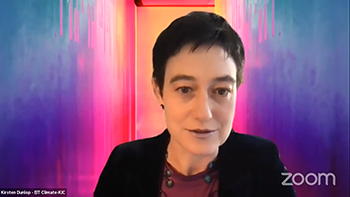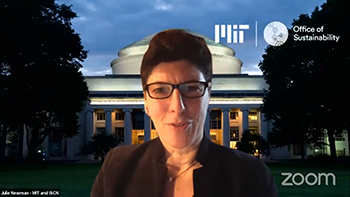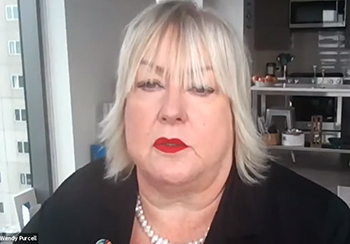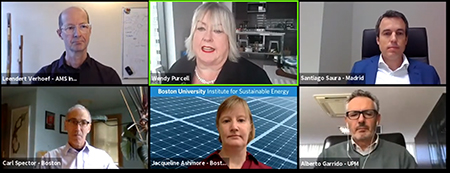[01/12/20] Seminarios UPM: University-City Collaboration Models for Climate Neutrality
By Dr. Wendy Purcell PhD FRSA Harvard T.H. Chan School of Public Health 8-Jan-2021
New Year’s Resolution? For universities and cities to work together for Climate Neutrality.
That was the call to action at UPM’s session on the subject held December 1, 2020. I had the pleasure to moderate the dialogue with our expert panelists and audience we explored the key question ‘What role can universities play to bring systemic change to the cities?’ The seminar sought to inspire collaboration between cities and universities in order to foster climate neutrality and highlighted the experiences of two cities in Europe and one in the United States of America.
 Kirsten Dunlop CEO of the Climate Knowledge and Innovation Community – the so-called ‘Climate KIC’ sponsored by the European Institute of Innovation and Technology, opened the event. She talked about their work to accelerate the transition to a zero-carbon economy and climate resilient society. Driven by a belief that a decarbonized, sustainable economy is necessary to prevent catastrophic climate change, and also presents a wealth of opportunities for business and society, Kirsten explained how the Climate KIC helps identify and support innovation to support society mitigate and adapt to climate change. The Climate-KIC brings together partners from the worlds of business, academia, and the public and non-profit sectors to create networks of expertise, through which innovative products, services and systems can be developed, brought to market and scaled-up for impact. Kirsten described the framework of university-city collaboration models and how Deep Demonstrations are fostering climate action in cities. And, she reminded us that this requires, “Systems thinking, joint programming, joint funding and blended finance to catalyze whole systems transitions.”
Kirsten Dunlop CEO of the Climate Knowledge and Innovation Community – the so-called ‘Climate KIC’ sponsored by the European Institute of Innovation and Technology, opened the event. She talked about their work to accelerate the transition to a zero-carbon economy and climate resilient society. Driven by a belief that a decarbonized, sustainable economy is necessary to prevent catastrophic climate change, and also presents a wealth of opportunities for business and society, Kirsten explained how the Climate KIC helps identify and support innovation to support society mitigate and adapt to climate change. The Climate-KIC brings together partners from the worlds of business, academia, and the public and non-profit sectors to create networks of expertise, through which innovative products, services and systems can be developed, brought to market and scaled-up for impact. Kirsten described the framework of university-city collaboration models and how Deep Demonstrations are fostering climate action in cities. And, she reminded us that this requires, “Systems thinking, joint programming, joint funding and blended finance to catalyze whole systems transitions.”
Turning to each of the city-university pairs, the seminar heard from Madrid, Amsterdam and Boston.
- Boston featured Carl Spector, Boston City and Jacqueline Ashmore, Boston University
- Amsterdam featured Leendert Verhoef, AMS Institute
- Madrid featured Santiago Saura, Madrid City Councilor and Alberto Garrido, Vice-Rector for Quality and Efficiency, UPM
The session explore the experience of working together and the benefits to each organization from the collaboration. It then took a deep dive into the challenges and barriers the partnership had to overcome or was still working through. It was clear that trust was a key factor to support effective partnership working, so the session discussed ways in which they invest in sustaining the relationship for value creation.
For example, Boston’s Green Ribbon Commission represents ten years of collaboration by the city with higher education, private sector business, developers, health care and cultural entities. It is an excellent example of formal mechanisms with governance and decision making structures. Madrid’s multi-stakeholder initiative with UPM under the El día después project has catalyzed a range of transformational partnerships focused on pandemic recovery and fulfilment of the Sustainable Development Goals using trust-based governance. And, Amsterdam was championing a range of ‘Living Labs’ to tackle issues in the city working through a shared institute.

Julie Newman, Director for Sustainability at MIT and also representing the ISCN rounded off the event with some key insights and learning for cities and universities going forward. Despite being physically separate, given the COVID-19 pandemic, she highlighted how we are connected as a community with a commitment to building a pathway forward for carbon neutrality. She was clear that we will not solve the problems of sustainability within the walls of a university campus, rather we need to draw on the connections a university has with its city and beyond nationally and internationally. Julie talked about MIT’s approach to tackling sustainability and climate and how it is framed by a commitment that considers scales of impact across the individual, campus, city, and globe.
The talks reinforced the role higher education plays in the science and development of climate mitigation strategies via education, research and innovation. As well as understanding the contribution universities and colleges are making to climate change, it was clear most were prioritizing actions to deal with their emissions and impacts. Joining with the cities and communities in which they live and learn, higher education institutions can accelerate change and shift from a transactional relationship between the university and the city to one that is truly transformational.
Common challenges among the city-university partners related to incentive alignment, governance and funding to name a few. The partners had developed creative solutions from shared physical and virtual spaces to support informal encounters, recognition of differential value creation across the partnership such as what was important for university tenure versus democratic city mandates and had created novel governance structures based on trust. Deep demonstrations, using the campus and city as ‘living labs’ was a good way to test out ideas and share learning.
 Going forward, it was clear we must continue to find ways for universities and cities to collaborate and address global challenges together. Closing the session, I spoke about the need for more of the radical collaboration the city-university pairs had modelled for us. The power of trustful co-creation enabled people from very different organizations to convene around a shared purpose – in this case a global societal challenge to deliver against climate neutrality.
Going forward, it was clear we must continue to find ways for universities and cities to collaborate and address global challenges together. Closing the session, I spoke about the need for more of the radical collaboration the city-university pairs had modelled for us. The power of trustful co-creation enabled people from very different organizations to convene around a shared purpose – in this case a global societal challenge to deliver against climate neutrality.
We left the event inspired by the ‘Power of With’ – universities working with their city and cities working with the university sector – knowledge partners in applied practice, connected, edgeless and acting with humility and trust in a spirit of reciprocity. New Year – New Climate!



